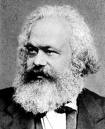CHAPTER XXIX-MARX

CHAPTER XXIX-MARX

I. HILDE BEGINS TO FORMULATE HER PHILOSOPHICAL PLAN TO TRICK HER FATHER, p. 381. While scheming, she reads that...
II. Sophie gets another letter stamped UN Battalion
A. Why be creative when oblivion ends the toil?
B. Question--how to escape from the mental captivity of being a fictional character in the consciousness of the creator? Note that we are overtly told, that soon, Sophie (and Hilde) will learn the answer; such 'direction' is termed Romantic irony defined as an author's reminding the reader that the 'reality' being described is after all an illusion. What does this kind of irony contribute thematically?
III. WE MUST READ BETWEEN THE LINES...
A. Sophie meets Scrooge--why bother with $$$?
B. The girl with the matches--Sophie first one in 100 years to buy a match.
C. The girl threatens to destroy Scrooge--the struggle of the classes defines Communism, and exemplifies a moral issue. Should those advocating social change employ violent means, given the legitimacy of the 'cause?' Did Ted Kaczynski? How about Jesus? How does one determine legitimacy?
D. Remember the Blue Bottle, the Red Bottle and the Greek Temple., p. 386 ff.
E. Study the temple as metaphor: Think of the Parthenon: the base = the material, economic and social relations which ground a society (p. 389), and religion, morals, art, philosophy and science are the superstructure. Now think of the match girl. What if the temple was built by match girls or slave labor as was once suspected in Egypt. Can the major accomplish his end without slaves? Is Sophie a slave? Is that why Hilde feels sorry for her?
IV. Marx in Germany had studied Democritus and Epicurus---(materialism) and Hegel.
(MARX) WHAT DOES THIS OBSERVATION HAVE TO DO WITH
SOPHIE AND HILDE AND THE MAJOR?
A. philosopher / historian / sociologist / economist
B. material changes affect the spiritual and not the converse--economic forces determine changes.
V. dialectical materialism--class struggle--think of Sophie and Hilde's reaction to the 'match girl.' How would Hume react?
A. conditions of production - resources
B. means of production - tools
C. ownership - of A & B
VI. History of society is the history of all its previous class struggle--the dialectic of the haves and the have nots. At the moment, is Hilde a have not, and her a father a have? Is he in turn a have not in someone else's mind? How then about Sophie? .
A. the slaves and the free--Sophie and Hilde?
B. feudal lord and the serf--Hilde and the major? CEO and worker?
C. aristocrat and citizen--a class society?
D. capitalism and worker--how we work affects who we are.
VII. work is positive and productive until the worker is forced to give his efforts to someone else--the worker slaves for another class.
A. 1848--The Communist Manifesto
B. horrors of Victorian society and the industrial revolution--MARX spent the last 34 years of his life in London, dying in 1883.
C. Capitalism is inherently destructive because it lacks self-control.
D. Modernization of factories means more and more unemployed or working for less.
E. “From each according to his ability; to each according to his need.”
VIII. Can the perfect state be achieved? [Plato]--Notice the irony at the end of the chapter, (p. 402).
A. Would justice be achieved if those who made the laws had to live under them?
B. Does Animal Farm provide a substantive critique of Marx?
SUPPLEMENTARY READING
1--Log on to my BRITISH LITERATURE WEB SITE and read the introduction to the Victorian Period. You will be introduced to a philosophical movement called UTILITARIANISM, and the philosophies of Jeremy Bentham and John Stuart Mill.
2--The site contains links to Mill and Bentham as well as the fiction of Charles Dickens, chiefly his novel of economic oppression, HARD TIMES.
3--See also SUPPLEMENTARY READINGS for Marx.
4--Orwell's Animal Farm, using the beast fable allegory, argues the classic refutation of Marx: "Some animals are more equal..."
5--Dickens' A Christmas Carol blends romantic sentimentality with economic realism.